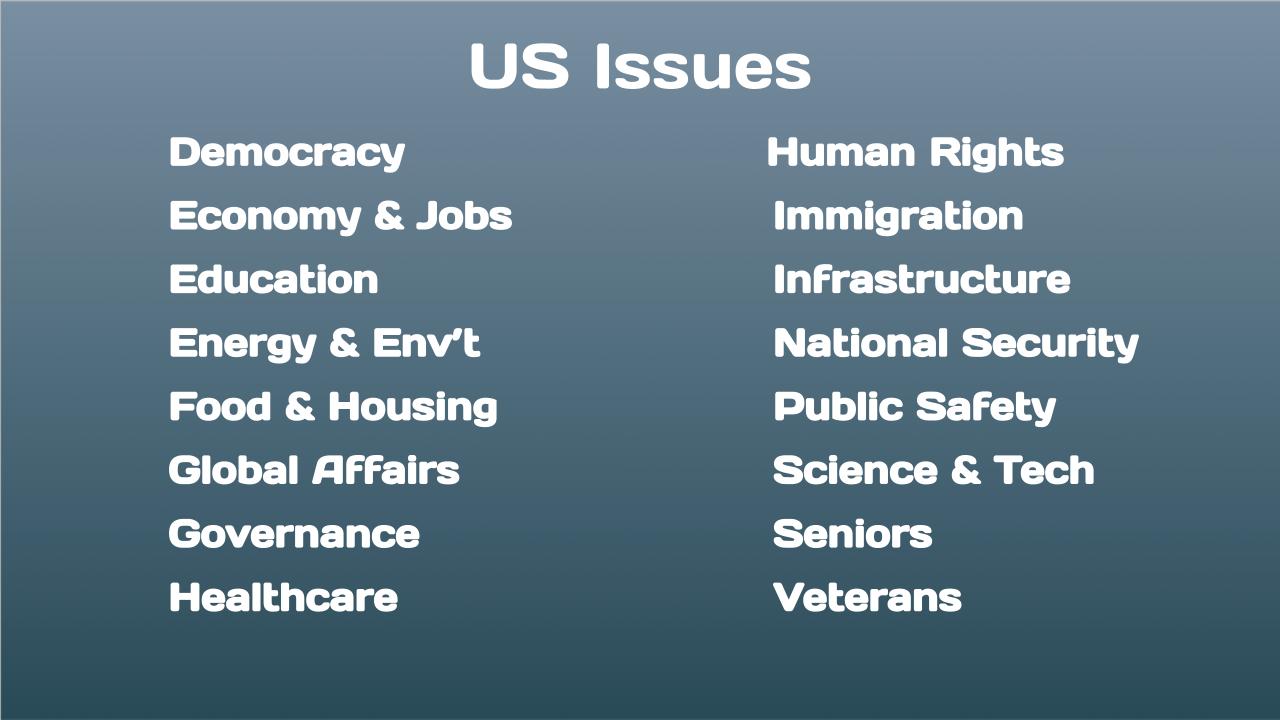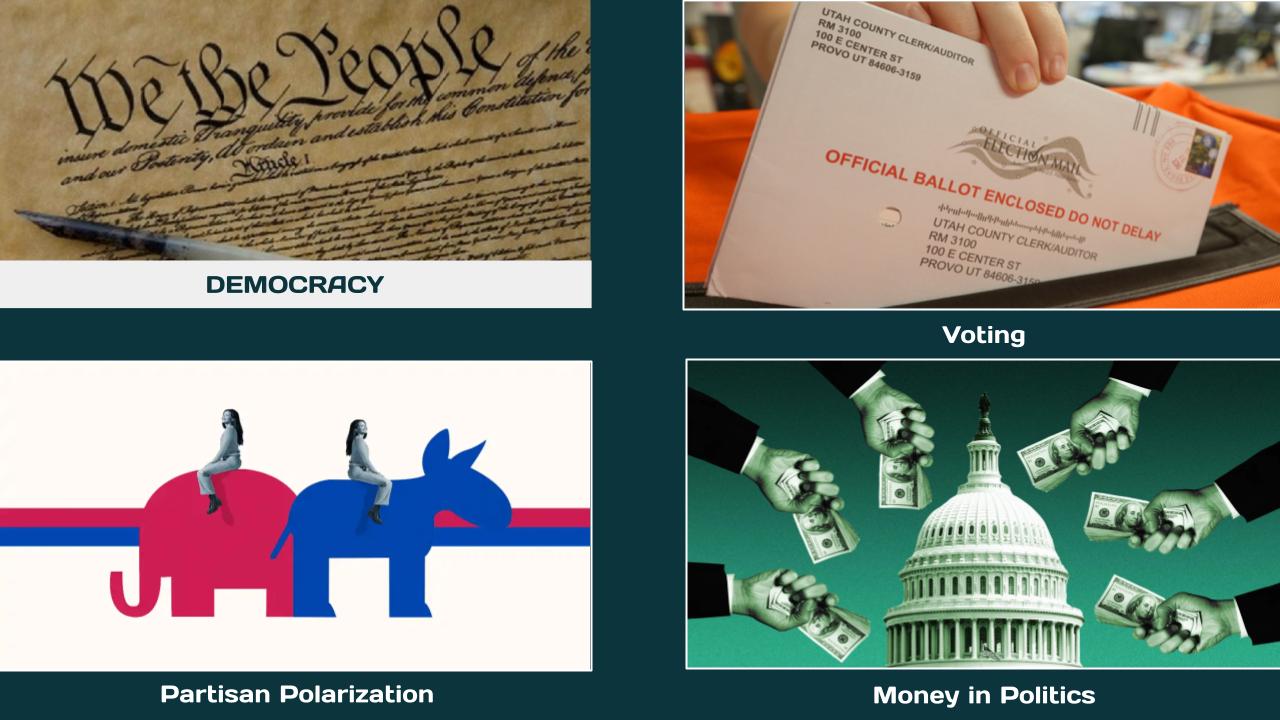Summary
US Curators have started posts on legislation being considered by Congress to address important issues facing the US. These issues fall into 16 categories:
Within each category, our curators have identified three of the most pressing issues being addressed by Congress as well as other issues related to the category. The first post in each category is a summary of all the specific posts in the category.
In each of the issue posts, there is a place for questions and feedback for the post’s curators and an area for ongoing forum discussions on the issue. Select the “Discuss” icon to go to this section. OnAir membership is required to comment. All that is needed to become an onAir member is one’s first and last name, email address, and zip code. OnAir does not share or resell this information.
OnAir Post: US Issues Overview
News
Charles Duhigg is a Pulitzer Prize-winning journalist and best-selling author whose latest book seeks to unlock the secret language of communication. He shares his Brief But Spectacular take on super communication.
The House announced Tuesday it will launch a bipartisan task force centered on artificial intelligence (AI).
In a release, Speaker Mike Johnson (R-La.) said he, along with Minority Leader Hakeem Jeffries (D-N.Y.), appointed 12 members each to sit on the task force.
The research panel will be chaired by Reps. Jay Obernolte (R-Calif.) and Ted Lieu (D-Calif.). The group will produce a report that will include recommendations for the future and bipartisan policy proposals related to AI.
The mission of the task force is to ensure the United States is leading the world in AI innovation, but it also considers the “guardrails that may be appropriate” as the widely popular emerging technology continues to raise potential security concerns.
The American Privacy Rights Act gives Americans fundamental, enforceable data privacy rights, puts people in control of their own data and eliminates the patchwork of state laws.
Washington, D.C. – House Committee on Energy and Commerce Chair Cathy McMorris Rodgers (R-WA) and Senate Committee on Commerce, Science and Transportation Chair Maria Cantwell (D-WA) unveiled the American Privacy Rights Act. This comprehensive draft legislation sets clear, national data privacy rights and protections for Americans, eliminates the existing patchwork of state comprehensive data privacy laws, and establishes robust enforcement mechanisms to hold violators accountable, including a private right of action for individuals.
“This bipartisan, bicameral draft legislation is the best opportunity we’ve had in decades to establish a national data privacy and security standard that gives people the right to control their personal information,” said Chair Rodgers and Cantwell. “This landmark legislation represents the sum of years of good faith efforts in both the House and Senate. It strikes a meaningful balance on issues that are critical to moving comprehensive data privacy legislation through Congress. Americans deserve the right to control their data and we’re hopeful that our colleagues in the House and Senate will join us in getting this legislation signed into law.”
“This landmark legislation gives Americans the right to control where their information goes and who can sell it. It reins in Big Tech by prohibiting them from tracking, predicting, and manipulating people’s behaviors for profit without their knowledge and consent. Americans overwhelmingly want these rights, and they are looking to us, their elected representatives, to act,” said Chair Rodgers. “I’m grateful to my colleague, Senator Cantwell, for working with me in a bipartisan manner on this important legislation and look forward to moving the bill through regular order on Energy and Commerce this month.”
“A federal data privacy law must do two things: it must make privacy a consumer right, and it must give consumers the ability to enforce that right,” said Chair Cantwell. “Working in partnership with Representative McMorris Rodgers, our bill does just that. This bipartisan agreement is the protections Americans deserve in the Information Age.”
The American Privacy Rights Act:
Establishes Foundational Uniform National Data Privacy Rights for Americans:
- Puts people in control of their own personal data.
- Eliminates the patchwork of state laws by setting one national privacy standard, stronger than any state.
- Minimizes the data that companies can collect, keep, and use about people, of any age, to what companies actually need to provide them products and services.
- Gives Americans control over where their personal information goes, including the ability to prevent the transfer or selling of their data. The bill also allows individuals to opt out of data processing if a company changes its privacy policy.
- Provides stricter protections for sensitive data by requiring affirmative express consent before sensitive data can be transferred to a third party.
- Requires companies to let people access, correct, delete, and export their data.
- Allows individuals to opt out of targeted advertising.
Gives Americans the Ability to Enforce Their Data Privacy Rights:
- Gives individuals the right to sue bad actors who violate their privacy rights—and recover money for damages when they’ve been harmed.
- Prevents companies from enforcing mandatory arbitration in cases of substantial privacy harm.
Protects Americans’ Civil Rights:
- Stops companies from using people’s personal information to discriminate against them.
- Allows individuals to opt out of a company’s use of algorithms to make decisions about housing, employment, healthcare, credit opportunities, education, insurance, or access to places of public accommodation.
- Requires annual reviews of algorithms to ensure they do not put individuals, including our youth, at risk of harm, including discrimination.
Holds Companies Accountable and Establishes Strong Data Security Obligations:
- Mandates strong data security standards that will prevent data from being hacked or stolen. This limits the chances for identity theft and harm.
- Makes executives take responsibility for ensuring that companies take all actions necessary to protect customer data as required by the law.
- Ensures individuals know when their data has been transferred to foreign adversaries.
- Authorizes the Federal Trade Commission, States, and consumers to enforce against violations.
Focuses on the Business of Data, Not Mainstreet Business
- Small businesses, that are not selling their customers’ personal information, are exempt from the requirements of this bill.
CLICK HERE to read the American Privacy Rights Act discussion draft.
CLICK HERE to read the section-by-section of the discussion draft.
In the 1968 film “2001: A Space Odyssey,” audiences found themselves staring at one of the first modern depictions of an extremely polite but uncooperative artificial intelligence system, a character named HAL. Given a direct request by the sole surviving astronaut to let him back in the spaceship, HAL responds: “I’m sorry, Dave. I’m afraid I can’t do that.”
Recently, some users found themselves with a similarly (though less dramatic) polite refusal from Gemini, an integrated chatbot and AI assistant that Google rolled out as a competitor to OpenAI’s ChatGPT. When asked, Gemini politely refused in some instances to generate images of historically White people, such as the Vikings.
Unlike the fictional HAL, Google’s Gemini at least offered some explanation, saying that only showing images of White persons would reinforce “harmful stereotypes and generalizations about people based on their race,” according to Fox News Digital.
The situation quickly erupted, with some critics dubbing it a “woke” AI scandal. It didn’t help when users discovered that Gemini was creating diverse but historically inaccurate images. When prompted to depict America’s Founding Fathers, for example, it generated an image of a Black man. It also depicted a brown woman as the Pope, and various people of color, including a Black man, in Nazi uniforms when asked to depict a 1943 German soldier.
Specific Issues
Democracy
Democracy category slides Democracy post
Money in Politics category slides Money in Politics post
Partisan Polarization category slides Partisan Polarization post
Voting. category slides Voting post
Economy & Jobs
Economy & Jobs category slides DEconomy & Jobs post
High Tech Manufacturing category slides High Tech Manufacturing post
Income Inequality category slides Income Inequality post
Inflation category slides Inflation post
Education
Education category slides Education post
AI in Education category slides AI in Education post
Apprenticeships category slides Apprenticeships post
STEM Learning category slides STEM Learning post
Energy & Enviornment
Energy & Env’t category slides Energy & Env’t post
Carbon-based Fuel category slides Carbon-based Fuel post
Climate Change category slides Climate Change post
Pollution category slides Pollution post
Federal Government
Federal Gov’t category slides Federal Gov’t post
Citizen Engagement category slides Citizen Engagement post
Deficit & Debt category slides Deficit & Debt post
Regulations category slides Regulations post
Food & Housing
Food & Housing category slides Food & Housing post
Food Insecurity category slides Food Insecurity post
Housing Availability category slides Housing Availability post
Sustainable Agriculture category slides Sustainable Agriculture post
Global Affairs
Global Affairs category slides Global Affairs post
China & Taiwan category slides China & Taiwan post
Middle East category slides Middle East post
Russia & Ukraine category slides Russia & Ukraine post
Healthcare
Healthcare category slides Healthcare post
Addiction category slides Addiction post
Health Promotion category slides Health Promotion post
Infectious Diseases category slides Infectious Diseases post
Human Rights
Human Rights category slides Human Rights post
Abortion category slides Abortion post
Discrimination category slides Discrimination post
Gun Rights category slides Discrimination post
Immigration
Immigration category slides Immigration post
Border Security category slides Border Security post
Dreamers category slides Dreamers post
Work Visas category slides Work Visas post
Infrastructure
Infrastructure category slides Infrastructure post
Broadband category slides Broadband post
Electric Grid category slides Electric Grid post
Transportationcategory slides Transportation post
National Security
National Security category slides National Security post
Cybersecurity category slides Cybersecurity post
NATO category slides Cybersecurity post
Robotic Warfare category slides Robotic Warfare post
Public Safety
Public Safety category slides Public Safety post
Disinformation category slides Disinformation post
Gun Safety category slides Gun Safety post
Prison Reform category slides Prison Reform post
Science & Technology
Science & Tech category slides Science & Tech post
Nanotechnology category slides Nanotechnology post
Regulating AGI category slides Regulating AGI post
Space Exploration category slides Space Exploration post
Seniors
Seniors category slides Seniors post
Longevity category slides Longevity post
Medicare category slides Medicare post
Social Security category slides Social Security post
Veterans
Veterans category slides Veterans post
Homelessness category slides Homelessness post
Job Opportunities category slides Job Opportunities post
Mental Health category slides Mental Health post


















